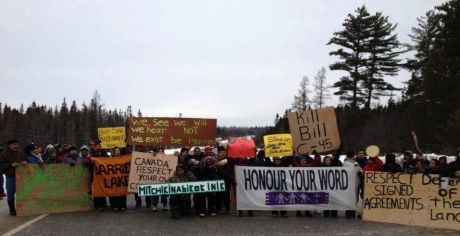Features
You are here
Solidarity with the Algonquins of Barrière Lake

April 25, 2013
For centuries, the Algonquins of Barrière Lake (ABL) have been fighting to protect their land, language and culture. They live on a stretch of land three hours north of Ottawa.
In 1991 the community signed a Trilateral Agreement with the governments of Quebec and Canada to share responsibility for decisions about land use in the area, their traditional territory, and to ensure that the cultural and spiritual use of the land would be honoured in however the land was used.
Colonial ‘democracy’
The governments of Quebec and Canada, rather than honouring the agreement, have erected roadblock after roadblock to prevent the community from exercising its rights. In the late 2000s they attempted to force the community to accept imposed elections and a form of representative government derived from section 74 of the Indian Act. In short, they imposed a foreign form of government, ignoring the long-standing traditions of direct democracy practiced by the ABL.
The story has been one of repeated attempts to force the ABL to comply with the worst impositions of the Indian Act and with unfair federal government “negotiation” agendas. The motivation for these actions is very clear: the area is rich in resources. The governments of Quebec and Canada have no interest in protecting indigenous land rights and traditions. They seek only to bolster the economic activity of corporations.
Resistance
The community successfully halted copper exploration on their land in 2011, but the Quebec government has not issued a moratorium nor taken any kind of action to honour the Trilateral Agreement. Now, a new company, Copper One, seeks to re-initiate mining exploration on the territory. Other companies with claims in the Trilateral Agreement area include Cenit, Mundiregina, Forest Gate Energy, Mines Virginia and the Quebec government-owned corporation SOQUEM.
The forests on the land are also in danger if the Trilateral Agreement is not upheld. Last summer, the ABL camped near a logging site and protested for three weeks to prevent forestry company Resolute from unilaterally using their land for wood extraction. There was solidarity from striking Quebec students, who declared that “support for Indigenous rights is central to our broader struggle for the common good.”
Because of this pressure, an oral agreement was eventually made to halt the development to allow the community to undertake harmonization measures—a process to ensure that forestry companies who want to operate on Barriere Lake’s land must not compromise the way that the Algonquins use the land. Under this process, logging is not allowed to take place near hunting cabins, in moose and bear habitat, in sacred areas and medicinal sites, and other areas.
Some community members did not trust the oral agreement with Resolute to halt logging, and do not agree with the 1991 Trilateral Agreement. After the oral agreement was made, some of them decided to blockade the logging road, continuing the protest. Subsequently, Resolute obtained an injunction against the entire community. The outcome of that event, which culminated in police violence against community members, was a court injunction that prevents ABL from going onto their own traditional territory to ensure it is not being abused.
In March of 2013 ABL issued an appeal for funds to fight the injunction.
Indigenous sovereignty
For ABL, this fight is about far more than just money or resources. For them, use of the land is inextricably linked with their identity, culture and spirituality of daily life. This is not about dividing the spoils but about cultural survival. A small number of community members may differ on approaches to use in their struggle, but the fault in this situation lies squarely with the federal and Quebec governments who have continued to stall and stonewall while the ABL territory is eroded out from under the feet of the community.
The Algonquins of Barrière Lake are on the front lines of Idle No More and its demands for a nation-to-nation relationship based on real respect for their land, culture, language and identity.
If you like this article, register now for Marxism 2013: Revolution In Our Time, a weekend-long conference of ideas to change the world. Sessions include “Indigenous resistance, Idle No More and the fight against Harper”, “Quebec, First Nations and Canadian imperialism”, and “From Red Power to Idle No More.”
Section:









